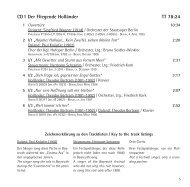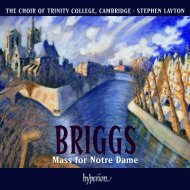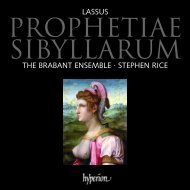Téléchargez le livret intégral en format PDF ... - Abeille Musique
Téléchargez le livret intégral en format PDF ... - Abeille Musique
Téléchargez le livret intégral en format PDF ... - Abeille Musique
You also want an ePaper? Increase the reach of your titles
YUMPU automatically turns print PDFs into web optimized ePapers that Google loves.
Tu vois <strong>le</strong> feu du soir, cast in Éluard’s favourite litany<br />
form, is another love song—a hymn of praise musically<br />
translated into a g<strong>en</strong>t<strong>le</strong> rhythm as immutab<strong>le</strong> as the poet’s<br />
devotion. This is music which shows Pou<strong>le</strong>nc’s strongly<br />
idealistic side: there is no room in the Éluard settings for lightweight<br />
caprice. However, at the same time as Tel jour tel<strong>le</strong> nuit<br />
was being writt<strong>en</strong>, Pou<strong>le</strong>nc discovered a writer whose words<br />
allowed and <strong>en</strong>couraged musical settings of charm—with (in<br />
his words) ‘a kind of s<strong>en</strong>sitive audacity, of wantonness, of<br />
avidity which ext<strong>en</strong>ded into song that which I had expressed,<br />
wh<strong>en</strong> very young, in Les Biches with Marie Laur<strong>en</strong>cin’. Not<br />
surprisingly for a composer who loved to write for the fema<strong>le</strong><br />
voice, this discovery was of a woman poet, Louise de Vilmorin<br />
(1902–1969). The poetess’s family was ce<strong>le</strong>brated for the<br />
plants, seeds and flowers produced on their estate of<br />
Verrières-<strong>le</strong>-Buisson. Pou<strong>le</strong>nc wrote: ‘Few peop<strong>le</strong> move me as<br />
much as Louise de Vilmorin: because she is beautiful, because<br />
she is lame, because she writes innately immaculate Fr<strong>en</strong>ch,<br />
because her name evokes flowers and vegetab<strong>le</strong>s, because<br />
she loves her brothers like a lover and her lovers like a sister.<br />
Her beautiful face recalls the sev<strong>en</strong>te<strong>en</strong>th c<strong>en</strong>tury, as does the<br />
sound of her name.’<br />
The three short songs that make up Vilmorin’s<br />
Métamorphoses are quintess<strong>en</strong>tial Pou<strong>le</strong>nc, and indeed make<br />
up a samp<strong>le</strong>r and mini-comp<strong>en</strong>dium of his three basic song<br />
sty<strong>le</strong>s: fast and capriciously lyrical (Reine des mouettes), slow<br />
(never very slow) and touchingly lyrical (C’est ainsi que tu es)<br />
and fast in the café-concert tradition, where moto perpetuo<br />
virtuosity is the thing (Paganini). That these <strong>en</strong>chanting<br />
feather-light songs stand chronologically close to Tel jour tel<strong>le</strong><br />
nuit shows the discerning versatility of Pou<strong>le</strong>nc’s song-writing<br />
in the late 1930s.<br />
Colloque, with a text by Paul Valéry (1871–1945), was<br />
unpublished until after Pou<strong>le</strong>nc’s death. True to its tit<strong>le</strong> it is a<br />
colloquy in which the two voices never sing together. Valéry’s<br />
original tit<strong>le</strong> for the poem (dedicated to Pou<strong>le</strong>nc) was<br />
‘Dialogues pour deux flûtes’. The composer admitted that<br />
although he admired Valéry as much as Verlaine or Rimbaud,<br />
he was not comfortab<strong>le</strong> in setting his words. The vocal line and<br />
harmonies are graceful <strong>en</strong>ough, but there is no real fusion<br />
betwe<strong>en</strong> words and music. The Deux Poèmes de Louis<br />
Aragon by contrast are perfect Pou<strong>le</strong>nc. In C, Louis Aragon<br />
(1897–1982) sees the fall of France into German hands in<br />
1940 as the sorry outcome of c<strong>en</strong>turies of false values and a<br />
patriotism that had be<strong>en</strong> based on class exploitation. On paper<br />
the words can seem bitter and angry, but Pou<strong>le</strong>nc finds<br />
the heartbreak in them: Marxist poet and château-dwelling<br />
composer (Pou<strong>le</strong>nc owned a beautiful country house at Noizay<br />
near Tours) are united in song by a common Fr<strong>en</strong>ch birthright.<br />
Fêtes galantes is an antidote to too much nationalistic selfpity.<br />
The nation that produced the coolly e<strong>le</strong>gant courtiers of<br />
Watteau’s ‘Fêtes galantes’ in the reign of Louis XV, now finds<br />
itself in comp<strong>le</strong>te disarray with the onslaught of the Nazi<br />
invaders. There is not much e<strong>le</strong>gance <strong>le</strong>ft in the Fr<strong>en</strong>ch comedy<br />
of manners, but ev<strong>en</strong> if manners are thrown out of the window,<br />
comedy remains. Life under the occupation changed many<br />
things, but the institution of the cabaret song, sung at full tilt,<br />
vulgar and poetic at the same time, could never be anything<br />
but defiantly, irrepressibly Fr<strong>en</strong>ch.<br />
Priez pour paix was writt<strong>en</strong> in the dark days of the Munich<br />
crisis. The words are by Char<strong>le</strong>s, duc d’Orléans (1394–1465).<br />
Pou<strong>le</strong>nc wrote: ‘I tried to give here a feeling of fervour and<br />
above all of humility (for me the most beautiful quality of<br />
prayer). It is a prayer for a country church.’ This is not only<br />
religious music; in a subt<strong>le</strong> way it strives to achieve a medieval<br />
hieratic atmosphere appropriate to the poet.<br />
In 1935 Pou<strong>le</strong>nc re-worked the music of the sixte<strong>en</strong>thc<strong>en</strong>tury<br />
composer Claude Gervais into his Suite française<br />
(both a chamber work and a piano suite). À sa guitare, also<br />
from this period, shows the hand of the tasteful pasticheur. All<br />
this music was, in fact, writt<strong>en</strong> for Margot, a play by Édouard<br />
Bourdet about Marguerite de Valois, although Pou<strong>le</strong>nc chose<br />
to set lines by Pierre de Ronsard (1524–1585). It was first<br />
sung by the famous singing actress Yvonne Printemps. The<br />
4
















